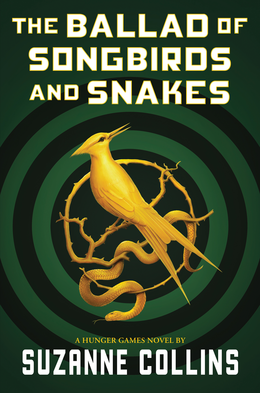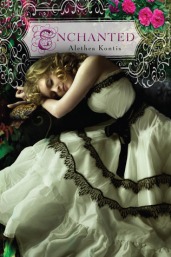
The Ballad of Songbird and Snakes is a prequel novel to the Hunger Games trilogy; a first person POV of young Coriolanus Snow, about to graduate Panem’s version of high school and move to university. It takes place a decade after the war that prompted the Hunger Games ended and starts right before the 10th Hunger Games, in a Capitol and Districts still devastated by the relatively recent war.
If you liked the Hunger Games trilogy, you’re likely to enjoy this novel as well. It’s lighter on the action, though better written (not surprising, given that Collins has continuously practiced her craft in the intervening years), and does an excellent job expanding on the world-building. Because it’s a prequel, we have a good sense of the story’s arc at the beginning, since the reader is familiar with the world 64 years into the future. However, I would recommend reading these in the order published; I think Snow’s character is a lot more interesting knowing who he and the world he leads becomes.
I really enjoyed Collins’ portrayal of Snow as a young man. I think his is a character that is challenging to write as a young person, but she gave us a flawed, believable teenager that clearly grows into the President Snow we meet in THG, without being a predictable, straight line path from teenager to most powerful man in THG universe. You can see that, like in real life, Snow grew in interesting and unpredictable ways in President Snow, while still being the same person.
President Snow has always been one of my favorite characters from THG, and one of my pet theories has been that Snow is not evil in the way he’s often described as. Now, don’t get me wrong – I’m not arguing that he is good. One of the themes of THG is that the problem isn’t Snow, or really any individual characters. Snow has always read to me like someone who has inherited a deeply flawed system and chose to perpetuate and improve the system, rather than accepting the cost of building a new one. He is almost incidental to the problem, a point rather aptly made when Katniss shoots Coin instead of Snow. But this symbolic destruction of the system by killing the woman who would perpetuate it, happens only because of Snow.
This isn’t redemption for Snow. Ballad makes it clear that Snow knowingly took advantage of a system that was, without a doubt, set up to benefit him/his class at the expense of others. As long as things were done through the system, he had few, if any, qualms about harming others to benefit himself. He fought to keep the system alive as long as he possibly could. But he reveled in Katniss’s final decision to kill Coin, understanding what that meant for Panem and the system he spent so long protecting and improving.
In Ballad, we see his background is a complicated mass of privilege and hardship; he was born into a system set up to benefit him enormously, yet the war stripped away many of the tools needed to make that journey easy. The aftershocks of the war are seen throughout Ballad: stability is more important than all else, and disaster too close to consider rocking the boat. Even the characters who recognize the system is broken seek to escape it rather than to change it. Throughout the book, you can see Snow moving from complicity in the system to active perpetuation, manufacturing necessity if not ideological agreement. By the time Snow has both the understanding and the power to truly change the system (which happens somewhere in between Ballad and THG), we can safely assume he finds the costs, both personal and societal, too high.
Compare that to Dr. Gaul, the semi-antagonist of Ballad, a woman who delights in cruelty and harm, and seeks to reveal and inflect it whenever possible. Her relationship with Snow in Ballad somewhat reflects President Snow and Katniss’s relationship in THG. However, while Dr. Gaul’s primary goal is to force Snow into agreeing with her ideological philosophy and worldview, President Snow’s primary goal with speaking with Katniss is to push her into both seeing and understanding system that she is fighting – something that Snow himself did not gain during Ballad, though he did begin the process.
As a villain, Snow is almost completely incidental to the story. Though he is exceptionally skilled at manipulating the sick system of THG, his character is not nearly as important as his existence as a figurehead refusing to change the system itself; even the reason for refusing to change it doesn’t matter. Any number of other characters could have easily been written as president – drunk, avoidant Haymitch; clueless, complicit Effie; a sadistic tribute – and little would have changed in terms of world building and even plot line, barring Katniss’ final decision to shoot Coin. Even his death is, at the end, incidental. Snow could have just as easily been jailed or slipped away never to been seen again; though less narratively satisfying, it would not have significantly impacted the sequences of events that followed.
But as an antagonist, President Snow’s character is vital. He, more than anyone, allows Katniss to see and understand the big picture, and through that understanding, gives her the insight and tools she needs to dismantle something that is made up of thousands of cumulative villainous acts, not just one evildoer. He is perhaps the only person in power who treats her as an equal, and in doing so, pushes her to develop the agency she needs to make that last, crucial decision. When personally arguing his own worldview, he does so in a way that allows her to develop her own interpretation of events, which was not the way he was taught – though the punishment for publicly disagreeing with him was steep and certainly meant as an extreme deterrent.
Where does that leave President Snow? In THG, though not in Ballad, he is the only person (the reader can be certain of) who understands the system and the role it plays in Panem. As the only person with the power to directly change this, he instead upholds it. Ballad spends some time in the 12th District and it’s clear that President Snow’s regime uses heightened oppression to increase living standards, though certainly not equity. He also deliberately chooses a path that gives Katniss a true choice in how Panem should rebuild. At no point are his intentions pure; his primary goal was to capture Katniss and quell the rebellion. But his secondary goal was to ensure that if Katniss faced the same decision he had faced, over and over again, she was given the opportunity to make it with as much context as he could give her.
Not, then, someone who inflicted cruelty for cruelty’s sake, but someone who saw oppression as a useful tool instead of a massive, horrific abuse of power, even while coming to understand that it was inherently, fatally, doomed from the start. And this conflict between his role as villain and his role as antagonist, is developed further by the events of Ballad. Snow is not made more sympathetic; his crimes are too great, his decisions too deliberate. Nor, however, is he made more monstrous. Instead, he is simply made more human.



